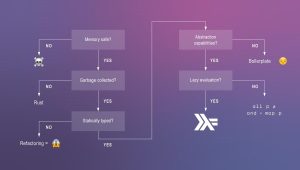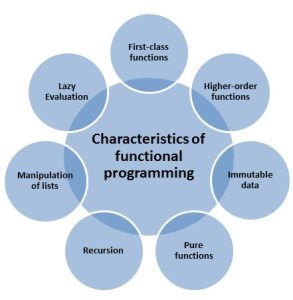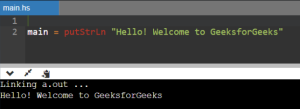Haskell Programming Language:
Haskell is a modern, standard, only functional, and non-strict language. It is specially designed to handle many applications from numbers to characters. It has an impressive syntax and vibrant built-in architecture.
Haskell is a functional language only, not limited to functional. It is specifically designed to handle large business applications.
It is known for its rich architecture. Haskell programs are written as mathematical functions.
Features of Haskell:

- Ease of understanding: Service functions are easy to understand. There are no conditions or criteria. Functional services are often easy to understand but difficult to implement.
- code reuse: Haskell supports polymorphism. For example, the above code will not only display numbers but also variables, column lists, name lists, etc. supports.
- Memory Management: In C, memory management is done with the keyword malloc or calloc, and the programmer has to free the memory after it is used up. However, in a Haskell-like study, the programmer is relieved of this burden. Storage is allocated, initialized, and returned by the garbage collector.
- Statically-typed: A statically typed language is one that recognizes variable types at compile time. It helps programmers identify bugs in real time. It helps reduce the complexity of large programs.
- Purely functional: It is a kind of design program that handles all mathematical calculations.
- Lazy evaluation: Functional programming like Haskell skips the evaluation of arguments in functions. This improves the performance of the code and helps to write programs efficiently.
- Type inference: Type inference solves the problem of code redundancy by identifying explicitly written programs for each type.
- Multithreading: A thread is a virtual processor for executing/executing steps in a program. Single-threaded messages are intended to be executed one at a time. Haskell is multilingual and able to process words simultaneously in one program. Multithreading increases the processing power of the rendering language.
Why use Haskell?

Haskell provides various characteristics like:
- Higher Programmer Efficiency
- Shorter, more concise, and manageable code.
- Higher reliability.
- Higher Compiling power.
Most of the life of a major software product is spent creating and maintaining it, since programming languages are easy to manage.
How to run Haskell code?
The Glasgow Haskell Compiler (GHC) is used to run the Haskell code. Features:
- It provides a cross-platform environment.
- Supports numerous extensions, libraries, and optimizations that help the process of generating and executing code.

Output:

Functional programming is based on mathematical functions. Some other programming languages that support functional programming paradigms are:
- Python
- Lisp
- Erlang
- Racket
- Closure etc
 End to End Technology Solutions
End to End Technology Solutions
